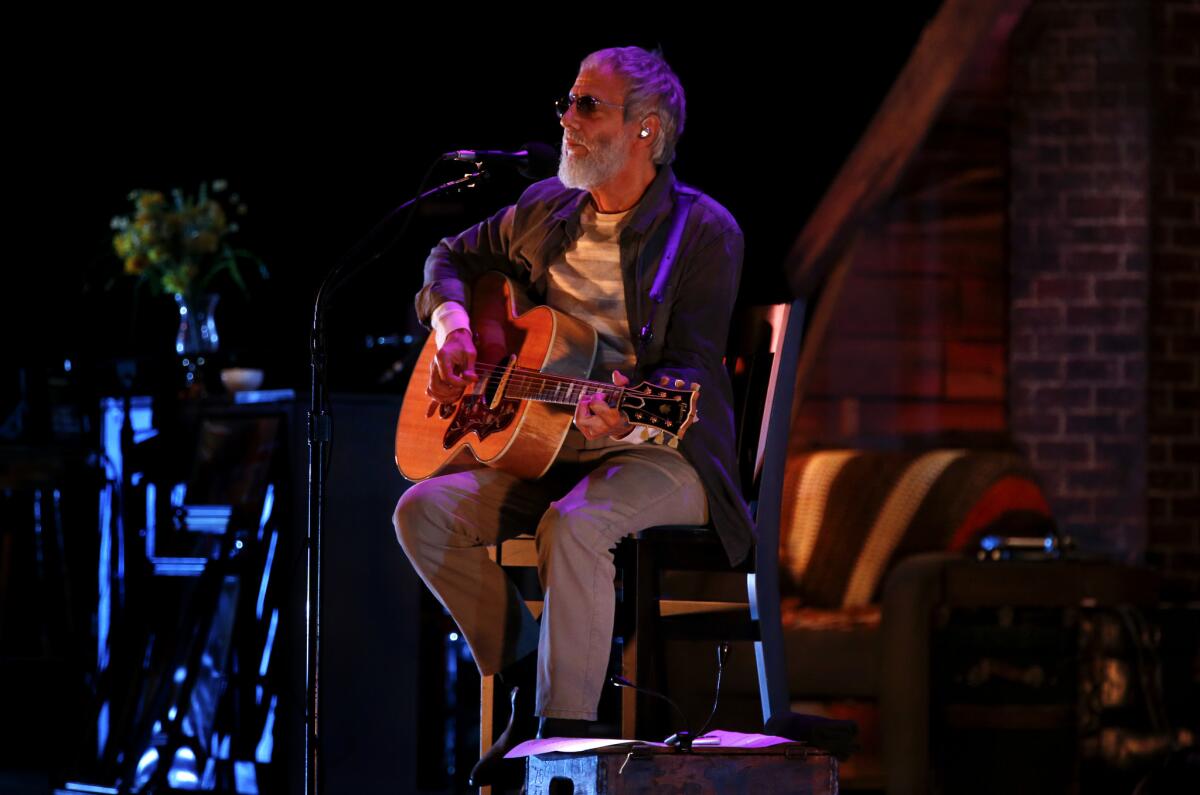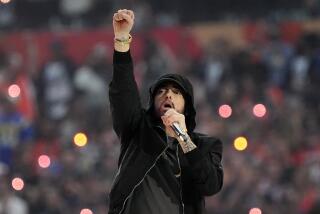Review: Yusuf/Cat Stevens marks 50th anniversary at Pantages

- Share via
Perhaps it’s relatively easy to put on a show as thoroughly engaging, and emotionally and spiritually rich, as the one Yusuf, the former Cat Stevens, pulled off Thursday at the Pantages Theatre in Hollywood.
Just write a couple of dozen eminently catchy pop songs and combine them with a life story drawn from 50-plus years spent on a bona fide spiritual quest and … voilà!
For the record:
10:03 p.m. Jan. 26, 2025An earlier version of this story stated that Islam did not perform the song “Wild World” during the concert. He did.
This year marks a half-century since the musician born Steven Demetre Georgiou, who was raised in London’s working-class West End, first made his mark musically, an anniversary he’s celebrating with a show anchored in the folk-pop-rock hits he churned out in the 1960s and ’70s. The two-night Thursday and Friday stop at the Pantages is the final one of a 12-date North American tour.
See the most-read stories in Entertainment this hour »
It was all performed on a charming and homey stage featuring a wood-paneled shack. The intent was to represent the house he grew up in, one that was attached to his Greek family’s London cafe.
For many pop stars, such a show could easily turn into the old gag about the self-obsessed guy who yammers on about himself at a party, only to stop and announce, “Well, enough about me — what do you think about me?”
But the 68-year-old’s life journey is one of the most extraordinary in pop. Hit songs such as “Wild World,” “Peace Train,” “Hard Headed Woman” and “Morning Has Broken” made him one of the biggest stars of the ’70s, an achievement he turned his back on at the end of the decade when he converted to Islam and retreated from public life.
For this performance — billed as “an acoustic evening” even though his two musical accomplices, guitarist Eric Appapoulay and bassist-percussionist Kwame Yeboah, employed electric and acoustic guitars and electric bass —Yusuf weaved a chronological narrative of his evolution from young fan to aspiring rocker to full-fledged star to spiritual seeker.
That allowed him to touch on such early hits as “I Love My Dog,” “Here Comes My Baby,” “Matthew and Son” and an evergreen he wrote in this late-’60s period, “The First Cut is the Deepest.”
He also delivered snippets of “There’s a Place For Us” from “West Side Story,” used to illustrate his early fascination with stage musicals, and touched on the Beatles’ “From Me to You,” highlighting the revolutionary impact the Fab Four’s music had on him.
In his own early songs, he demonstrated a period-specific melange of traditional British troubadour storytelling intermixed with a Broadway flair and a dash of psychedelia and progressive rock influences.
After being hospitalized with tuberculosis he developed from the stress and excessive lifestyle he engaged in during that first flirtation with fame, Stevens shifted gears. He began paying more attention to his inner life, something he credited to his brother, who introduced him to a book on spirituality, Paul Brunton’s “The Secret Path.”
That, he said, opened the door to a new realm of subject matter, which came to the surface in his 1970 album “Mona Bone Jakon” and continued to unfold through his signature 1971 work, “Tea for the Tillerman.”
Yusuf omitted some of his biggest hits — “Hard-Headed Woman” and “Two Fine People” among them — to keep the focus on the narrative of the story.
He quickly jumped over the quarter-century he devoted to pursuing his newfound Muslim faith — never, for instance, uttering the words “Islam” or “Muslim” during the show. He took a more circumspect approach, simply referring to a “change” he made, one for which he was initially vilified by some fans.
Yet during that time he married, and with his wife helped raised a family, which he succinctly referred to as “the next 27 years.” It was one of his sons, he said, who brought a guitar back into their house after he’d banished them from his life.
After releasing several sacred albums of spoken word recordings, he resurfaced in the pop world in 2006 with “An Other Cup,” from which he chose “Maybe There’s a World” and combined it with the Beatles’ “All You Need Is Love.”
Toward the end of the nearly 2 ½-hour performance, Yusuf trotted out his biggest sing-alongs, including “Peace Train” and “If You Want to Sing Out, Sing Out,” the latter popularized through its canny use by director Hal Ashby in 1971’s cult classic “Harold and Maude.”
He even recited lines from the climax of the recent Disney film “Zootopia,” in which the main character gives a stump speech about the importance of different species finding common ground. It elicited a hearty cheer from the capacity crowd.
His sandpaper tenor was as warmly captivating as ever, and his songs, which honor one man’s yearning for understanding in the world, still ring true. “If you can find a new way/You can do it today,” he sang in “If You Want to Sing Out, Sing Out. “You can make it all true/And you can make it undo/You see … it’s easy.”
Like we said.
Follow @RandyLewis2 on Twitter.com
For Classic Rock coverage, join us on Facebook
Now Yusuf rides the inner peace train
Yusuf/Cat Stevens’ ‘Peace Train’ tour arrives in L.A.
New Yusuf album, first North American tour in 35 years on tap
More to Read
The biggest entertainment stories
Get our big stories about Hollywood, film, television, music, arts, culture and more right in your inbox as soon as they publish.
You may occasionally receive promotional content from the Los Angeles Times.








